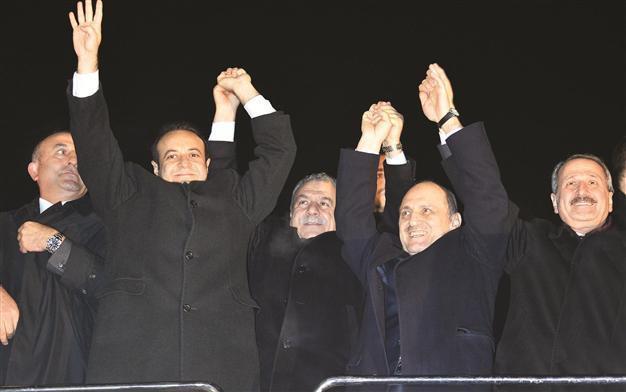Watchdog fines Turkish broadcasters for reading out newspaper articles on graft inquiry
ANKARA

Ex-ministers Zafer Çağlayan, Egemen Bağış, Muammer Güler and Egemen Bağış were cleared of graft allegations by their own party's members at a parliamentary commision.
Turkey’s TV watchdog has fined six private broadcasters for breaching a gag order on the parliamentary graft inquiry commission’s process by “reading out newspaper articles.”
The Supreme Board of Radio and Television (RTÜK) had announced that it would monitor TV broadcasters after the ban on the graft commission’s inquiry was issued.
Over 20 reports were prepared on the broadcasts made by those channels, and RTÜK eventually decided to hand out fines to six channels, including Samanyolu TV and its news broadcaster STV Haber. The head of both channels is Hidayet Karaca, who was arrested after an operation on Dec. 14 against media outlets close to the movement of the U.S.-based scholar Fethullah Gülen.
RTÜK said those channels read the testimonies that the four ex-ministers involved in the graft inquiry gave to the parliamentary commission that were published in several newspapers, including daily Hürriyet and daily Cumhuriyet. It argued that by doing so, the broadcasters "breached the rule of law.”
The fine comes just days after the commission, in which members of the ruling Justice and Development Party (AKP) formed a majority, ruled to dismiss the investigation into ex-ministers Zafer Çağlayan, Egemen Bağış, Muammer Güler and Egemen Bağış. It also ruled to destroy the wiretapped phone call recordings, which were the main evidence in the case, in yet another decision that stirred huge controversy.
An RTÜK official, Süleyman Demirkan, said the fine would be "consequential."
“The meetings of the parliamentary inquiry commission mostly appeared in newspapers. Those broadcasters were fined for reading those articles,” Demirkan said.
Demirkan, who was nominated to RTÜK by the main opposition Republican People’s Party (CHP), slammed the body’s attitude on the issue.
“Over the past few days [Deputy Prime Minister] Ali Babacan has answered the opposition’s questions, but incidentally his answers were not considered within the broadcast ban. If it’s forbidden to read out the headline stories of newspapers, it also should be forbidden to publish a defense against the claims,” he said.
Esat Çıplak, nominated to the board by the opposition Nationalist Movement Party (MHP), said the decisions were made by the members appointed by the AKP. “Punishing a broadcaster for arbitrary reasons or by government influence only exists in dictatorships,” he said.
Another RTÜK member selected by the CHP, Ali Öztürk, slammed the body, saying that it had become the “AKP’s stick.”
The government not only denies any wrongdoing, but also claims that the Dec. 17 and Dec. 25, 2013, graft probes were a coup attempt led by the Gülen movement to overthrow the government. Media outlets close to the AKP published news stories stating that both investigations were “coup attempts” and made mention of “conspiracies,” fueled by columnists who attacked critics as “fools who cannot see the truth,” although those claims are yet to be proven with concrete evidence by the judiciary.
